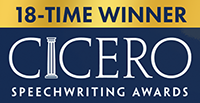How to write an award-winning speech
 Every speaker I know wants to write and deliver an award-winning speech.
Every speaker I know wants to write and deliver an award-winning speech.
But what makes a speech award-winning?
The best of the best?
Worthy of recognition or a prize (like a standing ovation, perhaps)?
It boils down to three simple things:
- An award-winning speech innovates.
- An award-winning speech communicates.
- An award-winning speech resonates.
Let’s dig in to these so you can write and deliver an award-winning speech the next time you speak in public.
First, an award-winning speech innovates.
Innovation is a quality that is admired, recognized and rewarded in our society. So it makes sense that speeches worthy of an award must contain one or more innovative elements.
When the central idea of a speech is presented in a new or different way, perhaps with a surprising twist, it tends to have staying power (which is exactly what your speech needs to do).
Your speech can be innovative in many ways:
1. In its structure
 How will you choose to organize your speech? What pattern or framework will you use?
How will you choose to organize your speech? What pattern or framework will you use?
Perhaps you want to take your audience on a journey based on a chronology, a process, a top-10 list, a problem/solution, or comparisons and contrasts.
But those aren’t the only ways to structure a speech. For example:
- The award-winning speech “Esteves, This is Your Moment: Go Ahead and Jump” was structured around the qualities embodied in the lead character of the movie “Eddie the Eagle” – qualities that the speaker wanted his key managers to adopt.
- The award-winning speech “Change the Status Quo” was structured around the “Think Different” theme of Apple’s 1997 advertising campaign. This structure allowed the speaker to suggest several ways the audience needed to “think different” about a universal challenge they were facing in their industry.
The structure you select matters because the structure of an award-winning speech is not accidental. Rather, it’s quite intentional, and this is where the innovation comes in.
(Tip: Think carefully upfront about how you will structure your speech. The first structure that comes to mind may not be the best, most innovative structure that suits your audience, your intention and your message.)
Once you’ve chosen your structure, be clear about it. From the earliest moments of your speech, your audience must understand the path you have chosen, and why, so they can follow you along the way. Proper transitions, artfully introduced, will signal your audience where you’re going next.
2. In its opening and closing
Most speakers have heard many times that an award-winning speech needs a strong opening and an even stronger closing. (If so, then why do so many speakers choose not to heed such timeless advice?)
Innovative openings and closings, because they are new and different, tend to “flip a switch” in people’s minds, causing them to subconsciously think, “Hey! This is something I haven’t heard before!” and pay closer attention.
A tepid opening and closing have no place in an award-winning speech. Rather, award-winning speeches call for boldness.
(Tip: If you want to write an award-winning speech, dare to be bold in some way when you start and end your speech.)
3. In its language
 Award-winning speeches are beautiful melodies. They sing. They delight! They have a rhythm about them that brings sheer pleasure to the ears that hear them.
Award-winning speeches are beautiful melodies. They sing. They delight! They have a rhythm about them that brings sheer pleasure to the ears that hear them.
Orchestrating all this with mere words once again requires innovation, defined by art, heart and imagination. Language absent innovation dooms a speech to drudgery.
Here are some quick examples of lively language from several award-winning speeches:
“We distribute everything from faucets to furnaces, pipes to pumps, and lighting to landscape irrigation.”
“Failure can be scary! And resiliency can be a struggle. But fearing failure is much worse.”
“If it weren’t for a free enterprise capitalist like Rockefeller, cities might have sprung up in place of National Parks. And our treasured, national spaces may have become hidden, private places.”
“Many of you are standing at the top of a new mountain right now, ready and waiting to glide down that slope … hit that bump … and then JUMP! And when you do? Everyone here will be watching you fly and seeing you land and cheering you on!”
(Tip: Read your earliest drafts aloud, paying careful attention to language. Does your speech sound like a white paper? Or a fascinating conversation?)
4. In its storytelling
Not everyone knows how to tell a good story. A real story.
Sometimes a well-intentioned storyteller attempts to tell a “story” that lacks one or more elements of an actual story, which calls for characters, a setting, plot, conflict and resolution.
Any of these so-called “stories,” because they are incomplete and therefore have no point, deserve no place in an award-winning speech.
Other times, unrelated stories are tacked on here and there throughout a speech for the sake of “story box-checking” by the speaker (who’s been told time and again, “You need to tell a story!”). When stories are tacked on rather than woven in, they can have a jarring effect on the audience.
Take a look at this brief story about the impact of nurturing entrepreneurs, which appears in the award-winning speech “Real Entrepreneurs Don’t Go It Alone”:
I remember my most challenging experience nurturing one of our clients at The Entrepreneurs Center. He had won an impressive contract – but spent those contract dollars on something else, which left a shortfall to complete the work.
The money had run out.
The situation was serious.
And yes, it was overwhelming even to me, and I was the one he had come to for help.
So I pulled it together, made a few phone calls and connected him with the right people who could advise him – and they did – all because he was associated with our business technology incubator.
I am proud to say this client listened, learned from his mistakes and is still in business after 12 years. And that’s what it’s all about.
(Tip: An award-winning speech is really a story in itself. In addition, award-winning speeches include stellar stories, nestled neatly into the overall story of the speech.)
5. In its appeal
 An award-winning speech is innovative in its appeal when it’s crafted for the precise audience invited to hear it.
An award-winning speech is innovative in its appeal when it’s crafted for the precise audience invited to hear it.
Because it was designed just for them, it hooks them. It speaks to them. It involves them.
After all, a speech that appeals to one particular audience may have zero appeal to another audience.
That is where the innovation comes in.
Here’s an excerpt from an award-winning speech that struck a chord with leaders in the call center industry:
Here’s the real problem with high turnover: It’s been so prevalent for so long, we not only expect it. But we accept it.
I hear service center managers say, “High turnover goes with the territory.” Or, “We’ve tried; there’s nothing you can do about it.” And, “It’s the reality – the way it’s always been.”
How sad is this?
Why do we – as supervisors, hiring managers, HR directors and vice presidents – just accept it as “a fact of life” that our service centers will always have high turnover?
Why do we tolerate the status quo as a given? A truth? An absolute?
Why do we get complacent rather than take the time to figure out a better way?
(Tip: Check your speech in progress now: What have you intentionally included in your remarks that speaks directly and personally to the people in your audience?)
Second, an award-winning speech communicates
1. It has a point
An award-winning speech has a purpose that is crystal-clear.
The speaker not only knows the purpose and point of the speech but also can recite that point or purpose from memory, and in a single sentence.
(Tip: If someone asks you, “What’s the point of that speech you’re giving in D.C. tomorrow?” make sure you are able to answer that question in a single sentence.)
 2. It makes that point clearly
2. It makes that point clearly
Communication is a two-way street. Even if the speaker knows his or her point or purpose when writing and delivering a speech, the audience has to get it.
Award-winning speeches are understood by their audiences. There must be no confusion.
(Tip: Test your speech for clarity by delivering it to a couple of people who pledge to give you honest feedback. Did they understand your purpose and point? Could they repeat it back to you? Did they get lost anywhere along the way? Did your remarks hold their attention?)
3. It makes that point in short order
In an award-winning speech, every word, phrase, sentence, example and story is necessary and included for a reason. Eliminating any of these would weaken the speech and make the message unclear.
Yes, it’s a tall order to make a point in short order. But this is the difference between a speaker destined to deliver an award-winning speech and one who is not.
(Tip: During the editing process, be ruthless in eliminating any tangents that somehow wound their way into your speech and lured you off your intended path.)
Third, an award-winning speech resonates
Resonance is simple to define but difficult to achieve.
An award-winning speech resonates when it has an outcome or impact long after the speech is over.
Here’s the resonance test:
- The audience can remember the speech.
- The audience can retell the story.
- The audience can – and does – act upon the message in some way.
(Tip: The resonating power of a speech starts with the message and ends with the speaker and his or her delivery style. Think about Oprah Winfrey’s January 2018 Golden Globes speech on the #MeToo movement and her passionate delivery, which ignited a national conversation and led the way for change in the entertainment industry and national media.)
If you’re writing your next speech now, ask yourself: Am I writing an award-winning speech?
In the end, award-winning speeches always do three things:
- They innovate – with their well-suited structure, opening and closing lines, lively language, storytelling power and audience appeal.
- They communicate – they have a point, and they make that point clearly and in short order.
- They resonate – with an outcome or impact that remains long after the speech is over.

















